Roofing Companies West Bromwich
Find the best Roofers in West Bromwich
Receive up to 3 Roofing Companies quotes for your project today! Compare profiles, reviews, accreditations, portfolio, etc... and choose the best service.

Prestige Midlands Limited
4309 reviewsWolverhampton, GBWelcome to Prestige Midlands Ltd, your one-stop shop for external residential home improvements. Prestige Midlands offer first-class home improvement services for very affordable and competitive prices. Drawing on 30 years plus of industry experience we specialise in providing high quality services to clients nationally. We can provide specialist bespoke services tailored to your needs, including: Main Roofs (New or Refurbished), Chimneys (removal, repointing, re-leading or rebuilds), Lead valley replacement. Ridge Tiling (Dry Ridge System), Dry Verge Clips for Gables Fascia/Soffit/Guttering including Downpipes Flat Roofing – Felt and Firestone EPDM (including conversion from asbestos and from flat to pitched.) Replacement Polycarbonate roofing for conservatories, porches and side passages. Heavy Duty Cladding for apex hips, front bays, including replacement Tudor features Full house or over door canopies – flat or pitched roof. Render and External Wall Insulation using the Johnson Stormshield system Replacement Windows and Doors –(including front and back residential, French and sliding patio doors.) Porches (flat or pitched roof) Patio and Garden landscaping including dwarf retaining walling. Driveways (Block Paving/ Gravel/ Slab/ Tarmac) Car Ports We are a company passionate about quality A wide range of colours, designs and finishes available to suit all properties from modern to period. Our eaves protection system (eps) is included when purchasing our fascia, soffit, guttering roofline upvc range. All installers are fully trained and qualified in the professional use of scaffolding towers and ladders All our products are manufactured to British standards and tested to withstand the British weather. Ten-year guarantee on all workmanship All Firestone EPDM flat roofing products come with a twenty-year guarantee (Manufacture Guarantee) We have fully trained, highly skilled and experienced installing teams within each of our divisions, enabling us to offer you one of the most reliable, professional and cost-effective services available nationally. “Prestige Midlands Ltd are authorised and regulated by the Financial Conduct Authority, FRN 788224. Prestige Midlands Ltd are a credit broker and not a lender. We offer credit facilities from panel off lenders” Prestige Midlands LTD: Company Number 9984144. VAT No 251350145
- Services
- Why Us?
- Gallery
Get Quote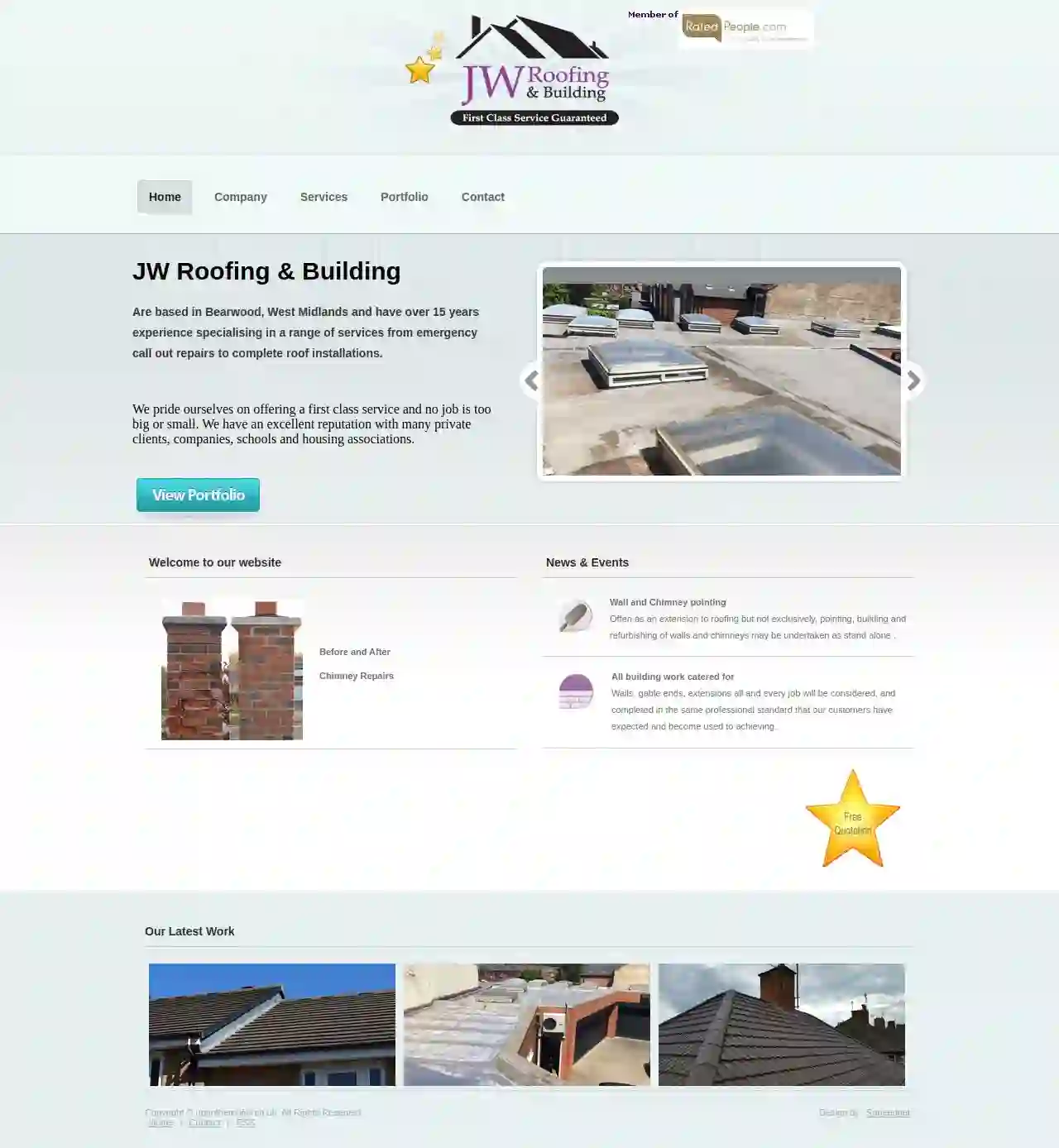
JW Roofing & Building
1.77 reviews80 Abbey Road, Birmingham, B67 5LH, GBJW Roofing & Building is a company based in Bearwood, West Midlands, with over 15 years of experience in a range of roofing services. From emergency call-out repairs to complete roof installations, they pride themselves on offering a first-class service for both domestic and commercial clients. They have a strong reputation with private clients, companies, schools, and housing associations. The company is committed to providing a professional, efficient, and quality service, with a focus on customer satisfaction. They are fully insured and offer a 7-day-a-week call-out service. JW Roofing & Building is an approved contractor for Sandwell Council and a member of Rated People, boasting an expert status due to numerous five-star ratings.
- Services
- Why Us?
- Accreditations
- Our Team
- Testimonials
- Gallery
Get Quote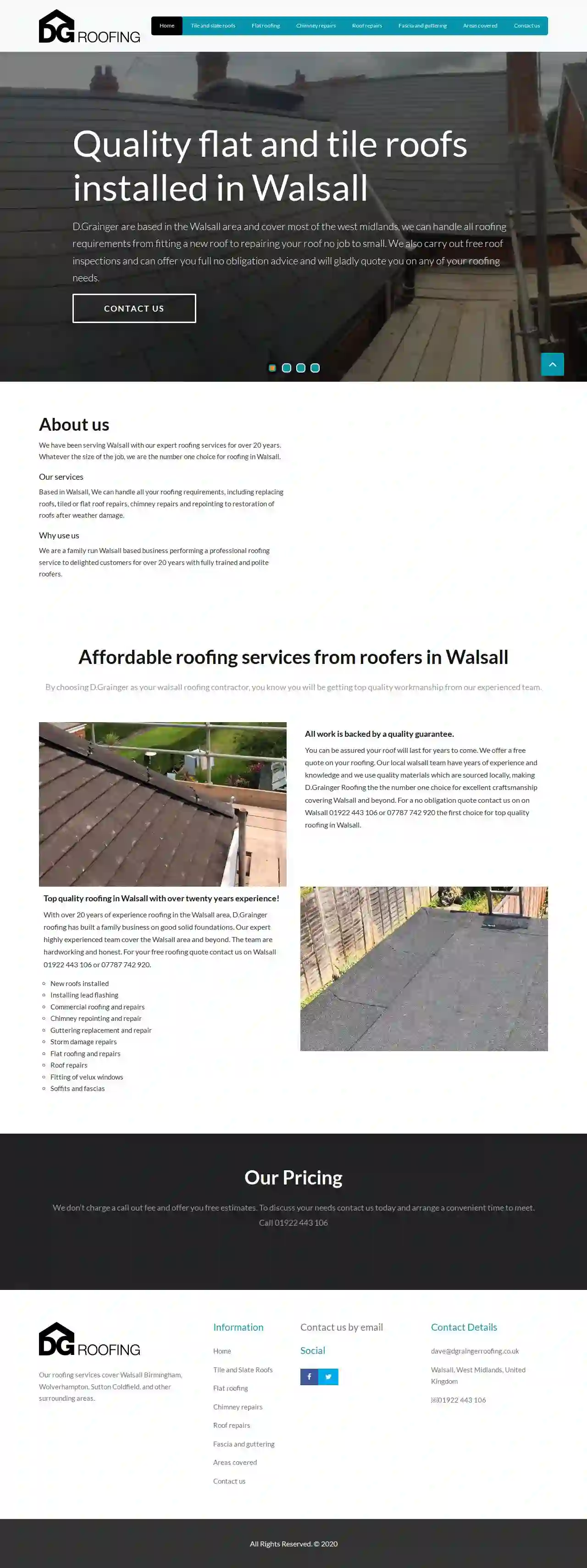
D Grainger Roofing
527 reviewsWalsall, GBD.Grainger are based in the Walsall area and cover most of the west midlands, we can handle all roofing requirements from fitting a new roof to repairing your roof no job to small. We also carry out free roof inspections and can offer you full no obligation advice and will gladly quote you on any of your roofing needs. We have been serving Walsall with our expert roofing services for over 20 years. Whatever the size of the job, we are the number one choice for roofing in Walsall.Our services include replacing roofs, tiled or flat roof repairs, chimney repairs and repointing to restoration of roofs after weather damage. We are a family run Walsall based business performing a professional roofing service to delighted customers for over 20 years with fully trained and polite roofers.
- Services
- Why Us?
- Gallery
Get Quote
Eurocell Cannock
4.824 reviewsCannock, GBEurocell is a leading manufacturer of PVCu building products, offering a wide range of products for the construction industry. Our products include fascias, soffits, capping boards, composite decking, fencing, doors, windows, and more. We provide high-quality products and expert advice to help you complete your building project. Contact us today to learn more.
- Services
- Why Us?
- Accreditations
- Gallery
Get Quote
Dryfix Cannock
59 reviews3 Old Hall Cottages, Stafford, ST19 9QT, GBHere at Dryfix Installations Limited, a well established, family-run firm of qualified roofers in Stafford and surrounding areas, we supply an array of roofing services covering anything from minor roof repairs to complete roof renewals. Our expert team pride themselves on delivering exceptional workmanship and customer service, with extensive knowledge of all types of roofing projects including new Topseal GRP flat roofing systems. Our clients can expect to receive priority in emergencies, and digital photographs of damage that has occurred can be supplied if necessary.
- Services
- Why Us?
- Accreditations
- Gallery
Get Quote
Dudley & Sons Roofing Ltd
4.635 reviewsBarnsley, GBWelcome! We’re Dudley & Son Roofing! Are you looking for a local roofer in Barnsley? Speak to Dudley! Dudley & Son Roofing is a fully certified roofing company serving Barnsley and the surrounding areas. We're a family-run business with a reputation for high-quality work and unrivalled personal service. We always ensure that our prices are competitive, we don’t believe in hidden costs or call out charges, and we even provide FREE written quotations, so you can be certain of our costs before choosing to work with us. Our team of fully qualified roofers are here to help! With over 15 years in the industry, we know what matters to you; competitive pricing, quality workmanship and a trusted team. Call Dudley & Sons Roofing on 01226 337 546 to arrange a free quote or simply for advice, we are always available to help.
- Services
- Why Us?
- Accreditations
- Our Team
- Testimonials
Get Quote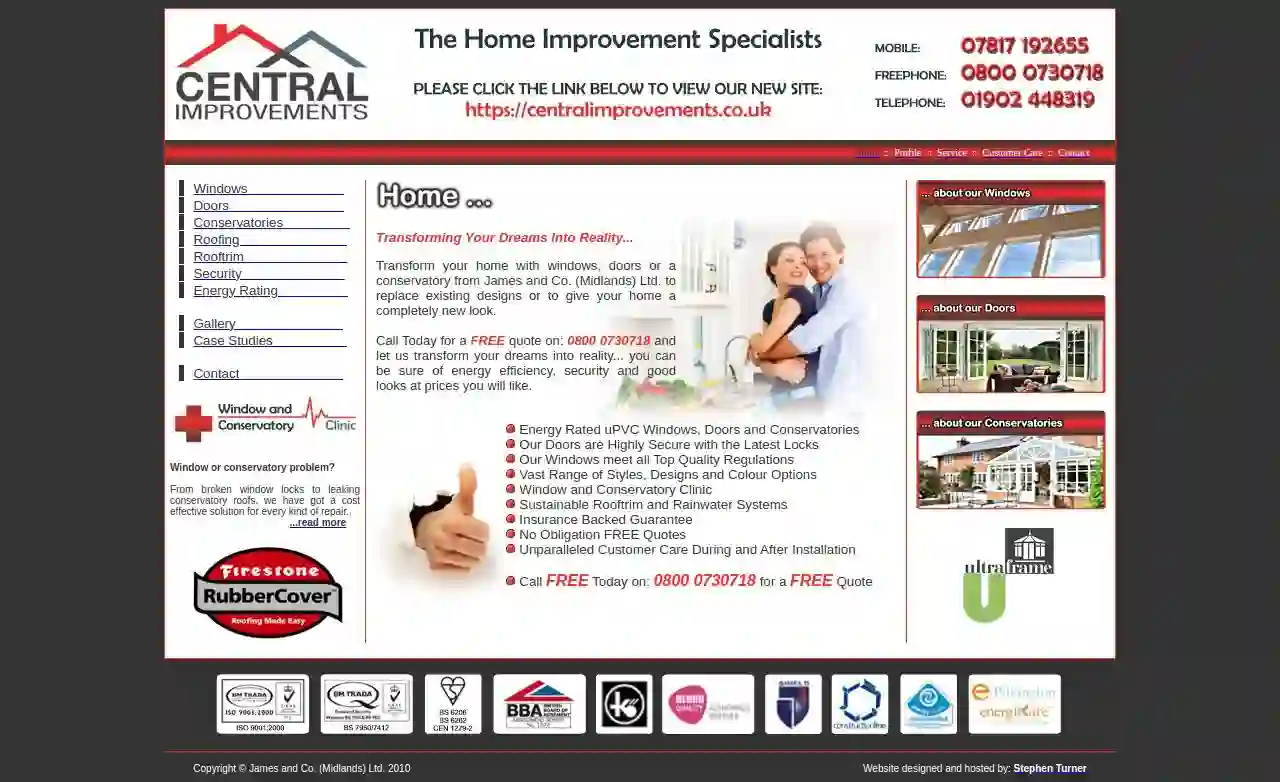
James & Co Midlands Ltd
42 reviewsHadley Heath Estate, Willenhall, Unit 4 Charlecote Rise, WV13 3EG, GBJames and Co. (Midlands) Ltd. is a family-run business with over 25 years of experience in supplying and fitting high-quality windows, doors, and conservatories to domestic and commercial customers throughout the UK. We pride ourselves on our commitment to customer satisfaction, offering expert advice, top-quality products, and a professional service at competitive prices. We believe in listening to our customers' needs and providing bespoke solutions that meet their individual requirements. Our design and development teams work closely together to ensure our products are always at the cutting edge of innovation and design, while our manufacturing process uses only the finest components, machinery, and fully trained and skilled staff. We guarantee that our products are built to last the pace of modern living. From the initial enquiry to the final installation, our team treats every customer with courtesy and professionalism. Our surveyors make accurate preparations for your installation with minimal fuss, and our fitting teams are true craftsmen, ensuring a high-quality finish.
- Services
- Why Us?
- Accreditations
- Our Team
- Testimonials
- Gallery
Get Quote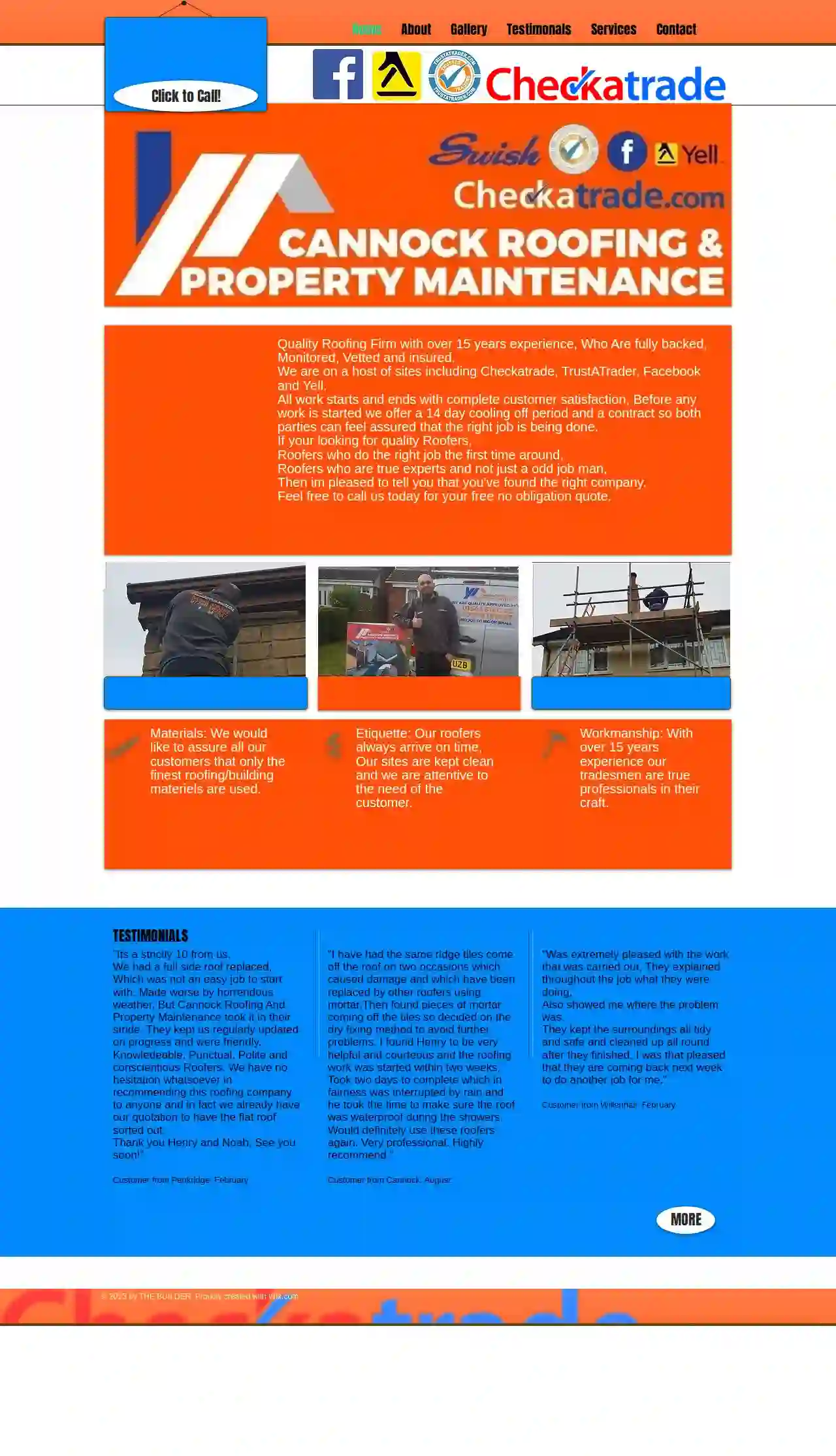
Cannock Roofing and property maintenance
532 reviewsCannock Chase Business Park, Hednesford, Unit 1, WS11 1AA, GBWelcome to Cannock Roofing and Property Maintenance, your trusted partner for all your roofing needs. With over 15 years of experience, we are a quality roofing firm fully backed, monitored, vetted, and insured. We pride ourselves on delivering exceptional customer satisfaction, starting with a 14-day cooling-off period and a comprehensive contract to ensure both parties are comfortable with the work to be done. If you're looking for expert roofers who prioritize quality workmanship and customer care, look no further. We are true professionals in our craft, dedicated to providing reliable and efficient solutions for all your roofing projects, big or small. We use only the finest roofing materials and maintain a high standard of etiquette, arriving on time, keeping our work areas clean, and attentively addressing your needs. Contact us today for a free, no-obligation quote and experience the Cannock Roofing difference. Materials: We assure our customers that only the finest roofing and building materials are used. Etiquette: Our roofers arrive promptly, maintain clean work sites, and prioritize customer needs. Workmanship: With over 15 years of experience, our tradesmen are true professionals in their field.
- Services
- Why Us?
- Our Team
- Testimonials
- Gallery
Get Quote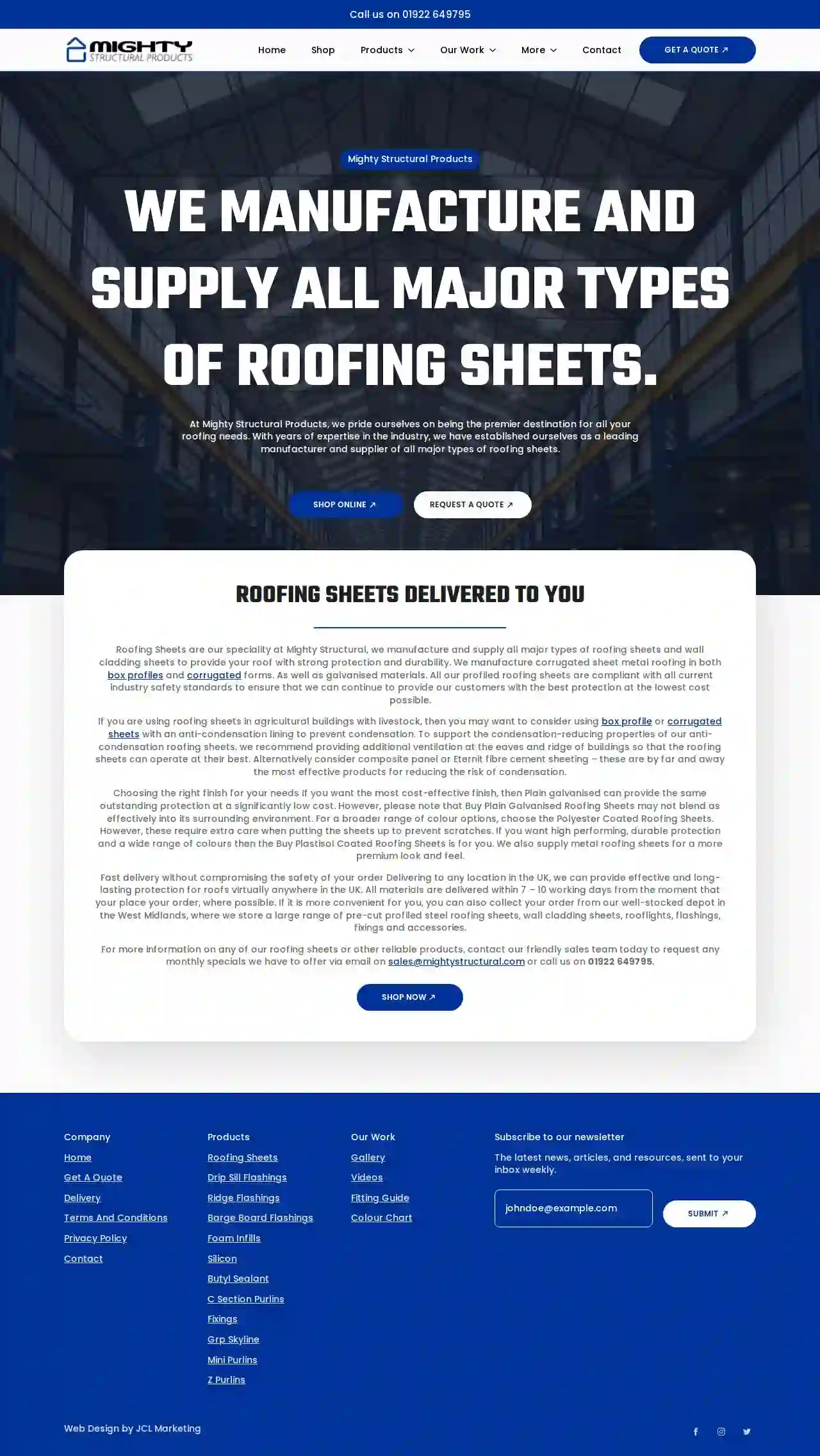
Mighty Structural Products
4.739 reviewsUnit C, Walstead Road, Walsall, WS5 4PG, GBMighty Structural Products is a leading manufacturer and supplier of all major types of roofing sheets and wall cladding sheets. With years of experience in the industry, they pride themselves on providing strong protection and durability for your roof. They offer a wide range of roofing sheets, including corrugated, box profile, and galvanised materials, all compliant with current industry safety standards. Mighty Structural Products also offers a variety of finishes, such as plain galvanised, polyester coated, and plastisol coated, to suit your specific needs and budget. They understand the importance of choosing the right finish for your project, and their team is happy to help you select the best option. In addition to roofing sheets, they also supply a range of other products, such as drip sill flashings, ridge flashings, barge board flashings, foam infills, silicon, butyl sealant, C section purlins, fixings, GRP skylights, mini Z purlins, and Z purlins.
- Services
- Why Us?
- Accreditations
- Our Team
- Testimonials
- Gallery
Get Quote
A1 Roofing Cannock
55 reviews41b Watermint Cl, Cannock, WS12 2GL, GBA1 Roofing Cannock is a roofing services company based in Cannock, Staffordshire, UK. We offer a range of services including emergency roofing works, slate roofing, industrial roofing, soffits repair & replacement, roof waterproof membrane, and soffits repair & replacement. Our team is dedicated to providing reliable and efficient roofing solutions to our clients in Cannock and surrounding areas. With 24-hour, seven-day-a-week service, we are always available to help with any roofing needs. Contact us today to learn more about our services and how we can help you.
- Services
- Why Us?
- Gallery
Get Quote
Over 12,314+ Roofers onboarded
Our roofing experts operate in West Bromwich & beyond!
Roofyng.co.uk has curated and vetted Top Roofers in West Bromwich. Find a reliable pro today.
Frequently Asked Questions About Roofing Companies
- Ventilation: Soffit vents provide intake ventilation, allowing fresh air to enter the attic and regulate temperature and moisture.
- Aesthetics: It creates a finished look to the roof's underside.
- Pest Control: A properly sealed soffit prevents pests like birds and squirrels from nesting in the attic.
- Metal roofs: Reflect sunlight, reducing cooling costs.
- Tile roofs: Offer thermal mass, regulating temperature.
- Cool roofs: White or light-colored roofs with high solar reflectance.
- Green roofs: Vegetated roofs providing insulation and reducing heat absorption.
- Asphalt Shingles: Popular, affordable, available in various styles (3-tab, architectural, etc.)
- Metal Roofing: Durable, long-lasting, energy-efficient, available in panels, shingles, or tiles.
- Tile Roofing: Clay, concrete, or slate; known for longevity, durability, and aesthetic appeal.
- Flat Roofing: EPDM rubber, TPO, PVC, modified bitumen, or built-up roofing (BUR).
- Slate: Natural stone, extremely durable, expensive, requires expert installation.
- Wood Shakes or Shingles: Natural wood, aesthetically pleasing, requires regular maintenance.
What is a soffit, and why is it important for my roof?
How often should I clean my gutters?
What are some energy-efficient roofing options?
What are the different types of roofing materials?
What is a soffit, and why is it important for my roof?
- Ventilation: Soffit vents provide intake ventilation, allowing fresh air to enter the attic and regulate temperature and moisture.
- Aesthetics: It creates a finished look to the roof's underside.
- Pest Control: A properly sealed soffit prevents pests like birds and squirrels from nesting in the attic.
How often should I clean my gutters?
What are some energy-efficient roofing options?
- Metal roofs: Reflect sunlight, reducing cooling costs.
- Tile roofs: Offer thermal mass, regulating temperature.
- Cool roofs: White or light-colored roofs with high solar reflectance.
- Green roofs: Vegetated roofs providing insulation and reducing heat absorption.
What are the different types of roofing materials?
- Asphalt Shingles: Popular, affordable, available in various styles (3-tab, architectural, etc.)
- Metal Roofing: Durable, long-lasting, energy-efficient, available in panels, shingles, or tiles.
- Tile Roofing: Clay, concrete, or slate; known for longevity, durability, and aesthetic appeal.
- Flat Roofing: EPDM rubber, TPO, PVC, modified bitumen, or built-up roofing (BUR).
- Slate: Natural stone, extremely durable, expensive, requires expert installation.
- Wood Shakes or Shingles: Natural wood, aesthetically pleasing, requires regular maintenance.